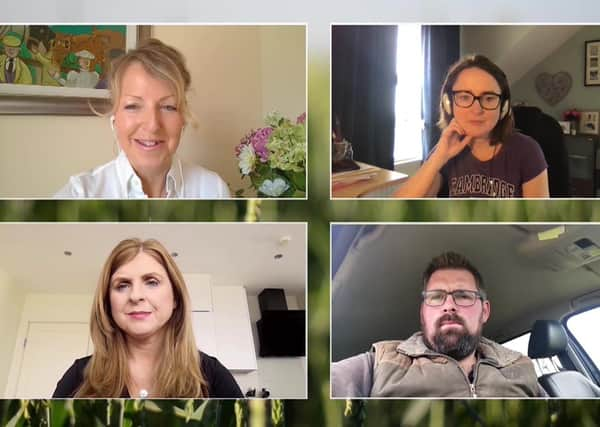Let’s talk about mental health in our industry


He is tall and strong and spends his days working the land.
But it isn’t his physical strength that makes him brave, it is the fact that he is a young farmer who lives with depression and he is not afraid to talk about it.
Northern Ireland has the worst suicide rates in the UK and 30pc of the population have issues with their mental health yet many people struggle to talk about their problems. We need to get better at it.
Advertisement
Advertisement
In recognition of the Covid 19 pandemic; our troubled past; the pressure on young people and the increasing demand on our mental health services Northern Ireland’s Health Minister has appointed an interim Mental Health Champion, Professor Siobhan O’Neill.
In the third of the ABP Now We’re Talking Farming podcasts, Prof O’Neill joined me from her sheep farm in Claudy along with Rural Support Chief Executive Veronica Morris and farmer David Devine to talk about how lockdown has impacted farm families.
We know people living in the countryside are social animals, from ‘Young Farmers’ to the throng who regularly meet at local marts. We relish the opportunity to catch up with friends and neighbours because working the land can often result in long hours on isolated farms where contact with others is very limited.
In recent months we have all experienced what it feels like to be cut off from friends, family, work colleagues and customers but how would you cope if that was the situation you found yourself in on a more regular basis? How would you look after your physical and mental health while managing the demands of a business which runs 24/7?
Advertisement
Advertisement
On the flip side, perhaps you found lockdown to be a positive experience, prompting the question: are farm families more resilient?
David Devine has a dairy, beef and sheep farm. He is married with two young children and is currently President of City of Derry YFC. He has a lot on his plate and admits that he sometimes struggles to find a work life balance.
Eight years ago he was diagnosed with depression. He didn’t recognise the symptoms immediately and waited for months almost hoping that a change in season would lift his mood but it never came. One day he physically couldn’t get off a sofa to go and plough a field.
Even now he says it is hard to talk about that period in his life. “At the time I was rehearsing for the YFC gala, singing and dancing every night but inside I was dying. It was easy to hide.”
Advertisement
Advertisement
David has since become a dad and knows how to recognise when he is overdoing things or needs to step back. “You have to manage your mental health just as you would a physical health condition,” he said.
Veronica Morris, the Chief Executive of Rural Support, revealed calls to their office trebled during lockdown. She said common reasons people needed help were bereavement, loneliness, debt, farm succession, terminal illness diagnosis.
She says there is a growing awareness of mental health issues and any stigma that existed in rural communities is beginning to fade. She urges us all to look out for signs that friends or neighbours are not themselves and not to be afraid to ask sensitively, ‘are you ok?’
Professor O’Neill is confident that mental health is now a political priority for the Executive.
Advertisement
Advertisement
She believes support need not always be costly and is calling for members of the public to be trained to recognise signs of poor mental health. “Veterinary surgeons is a great idea because they already have an established relationship with the farmer but solicitors and accountants too often share people’s concerns. It is about using connections and the goodwill within communities which has been so evident during the pandemic.
“Another huge positive to come out of all this is the renewed interest in key workers, that includes farmers and farm families who provide us with food,” said Professor O’Neill. “They are valued now in a way they might not have been before. We also value our environment and our outdoor space; farmers are seen as the custodians of that environment and should be more valued for that too. It is important that we harness that positivity and don’t lose it as we move forward to a different sort of normal.”
If you have been affected by any of the issues we have been discussing on Episode 3 of the ABP Now We’re Talking Farming Podcast and need to talk to someone you can call Rural Support on 0800 138 1678 or the Samaritans on 116123.
If you want to watch/listen to this episode or the others which featured emotional stories around farm safety or some great advice on career prospects within the agri food sector you’ll find the podcast www.abpfoodgroup.com